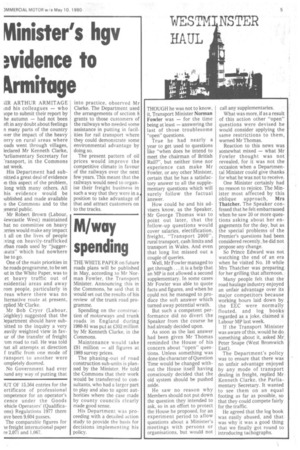Minister's hgv )vidence to lirmitage
Page 7

If you've noticed an error in this article please click here to report it so we can fix it.
;IR ARTHUR ARMITAGE Ind his colleagues — who lope to submit their report by he autumn — had not been aft in any doubt about feelings n many parts of the country ver the impact of the heavy orry on rural areas where oads went through villages, leclared Mr Kenneth Clarke, 'arliamentary Secretary for 'ransport, in the Commons ast week.
His Department had subrutted a great deal of evidence In this aspect of the problem, long with many others. All his evidence would be ■ ublished and made available o the Commons and to the ;eneral public.
Mr Robert Brown (Labour, .lewcastle West) maintained hat no committee on heavy )rries would make any impact t all on the lives of people .ving on heavily-trafficked .rban roads used by luggerLauts" which had nowhere Ise to go.
One of the main priorities in he roads programme, to be set iut in the White Paper, was to et heavy traffic out of esidential areas and away rom people, particularly in reas where there was no lternative route at present, eplied Mr Clarke.
Mr Bob Cryer (Labour, :eighley) suggested that the )epartment should have subiitted to the inquiry a very eavily weighted view in favur of the transfer of freight -om road to rail. He was told at all attempts at direction I traffic from one mode of ransport to another were ompletely doomed.
No Government had ever )und any way of putting that into practice, observed Mr Clarke. The Department used the arrangements of section 8 grants to those customers of the railways who needed some assistance in putting in facilities for rail transport where they could demonstrate some environmental advantage by doing so.
The present pattern of oil prices would improve the competitive climate in favour of the railways over the next few years. This meant that the railways would need to organise their freight business in such a way that they were in a • position to take advantage of that and attract customers on to the tracks.




















































































































